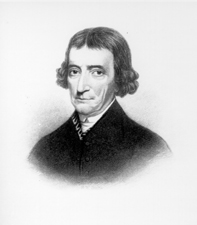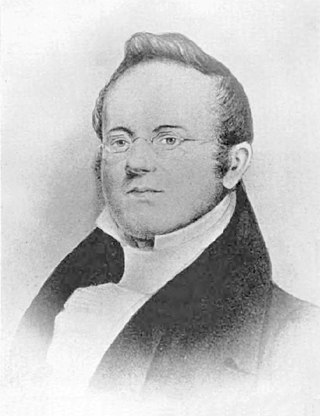
George Madison Bodge (February 14, 1841 - July 17, 1914) was an American author and historian best known for his study of King Philip's War. He also wrote and edited numerous articles and books focusing on the Unitarian Church and genealogy.

George Madison Bodge (February 14, 1841 - July 17, 1914) was an American author and historian best known for his study of King Philip's War. He also wrote and edited numerous articles and books focusing on the Unitarian Church and genealogy.
Bodge was born in Windham, Maine, on February 14, 1841, the third of five children, to Rev. John Anderson Bodge and Esther A. Harmon. [1] [2] : 316–317 John Anderson Bodge became a clergyman after working as a blacksmith.
On July 15, 1861, George Bodge enlisted into the 7th Maine Volunteer Infantry Regiment as a fife major for three years of service, but was discharged October 26, 1862, likely when the unit was ordered back to Portland, Maine, to recruit. His enlistment documents show him to be a single school teacher when he enlisted. [3] After the war, he attended Bowdoin College, graduating in 1868. [4] He continued his career as an educator, serving as the principal of Gould Academy in Bethel, Maine, until 1871, of Gorham Seminary until 1874, and of the Westbrook Seminary, which later became Westbrook College. He remained at Westbrook for four years. [5]
Bodge then chose to attend Harvard Divinity School and graduated in 1878. After graduation, he was ordained as a Unitarian pastor and served at the Third Society, Dorchester, Massachusetts (Unitarian), until October 31, 1884. [4] [6] He then became the minister of the First Parish of Westwood, Massachusetts, on February 19, 1899. [6]
He died in West Roxbury, Massachusetts, on July 17, 1914, of gangrene in his left leg. [1] He left behind a wife, Esther Ann (Harmon) Bodge, and two daughters.
Bodge was the author of several works. The Narragansett Fort Fight, December 19, 1675 (1886) is a specific account of the battles and participants that made up the Narragansett Fort Fight. Soldiers in King Philip's War: Being a Critical Account of That War with a Concise History of the Indian Wars of New England from 1620–1677 (1892) was written by Bodge when he was the Chaplain for the Massachusetts Society of Colonial Wars. This was the first attempt by an historian to document the name of those credited with military service in the New England Indian Wars, along with giving historical specifics of battles and military operations at the company level. It has become historically significant in its level of detail and genealogically significant in that it provides a resource for identifying residences of those with military service and an estimated date and place of death for those killed. Memoir of Nathaniel Foster Safford (1893) is an account of Nathaniel Foster Stafford, a Massachusetts attorney and member of the New England Historic Genealogical Society written upon his death. It includes a brief genealogy of the Safford family. The Churchill Family in America is a genealogy of the Churchill family of New England, written by Gardner Asaph and Nathaniel Wiley Churchill and edited by George M. Bodge
Bodge was a member of several societies and organizations, including the Grand Lodge of Massachusetts, [7] The Mayflower Society, the Massachusetts Society of Colonial Wars, the New England Historic Genealogical Society and the Sons of the American Revolution.

Windham is a town in Cumberland County, Maine, United States. The population was 18,434 at the 2020 census. It includes the villages of South Windham and North Windham. It is part of the Portland–South Portland–Biddeford, Maine Metropolitan Statistical Area.

Bowdoin College is a private liberal arts college in Brunswick, Maine. When Bowdoin was chartered in 1794, Maine was still a part of the Commonwealth of Massachusetts. The college offers 35 majors and 40 minors, as well as several joint engineering programs with Columbia, Caltech, Dartmouth College, and the University of Maine.

King Philip's War was an armed conflict in 1675–1676 between a group of indigenous peoples of the Northeastern Woodlands and the English New England Colonies and their indigenous allies. The war is named for Metacomet, the Pokanoket chief and sachem of the Wampanoag who adopted the English name Philip because of the friendly relations between his father Massasoit and the Plymouth Colony. The war continued in the most northern reaches of New England until the signing of the Treaty of Casco Bay on April 12, 1678.

John Chandler was an American politician and soldier of Maine. The political career of Chandler, a Democratic-Republican, was interspersed with his involvement in the state militia during both the American Revolutionary War and the War of 1812.

Elbridge Gerry was an American lawyer, who served as a U.S. Congressman from Maine from 1849 to 1851.

William Durkee Williamson was the second Governor of the U.S. state of Maine, and one of the first congressmen from Maine in the United States House of Representatives. He was a member of the Democratic-Republican Party. Williamson was also an early historian of Maine.

Holman Staples Melcher was an American military officer, businessman, and politician active during the Reconstruction Era. A faction of historians and soldiers controversially contend that he led the downhill bayonet charge of Little Round Top during the Battle of Gettysburg. Aside from his feats during the American Civil War, he served two one-year terms as the Mayor of Portland, Maine, from 1889 to 1890.

John Fairfield was an attorney and politician from Maine. He served as a U.S. Congressman, governor and U.S. Senator.

Charles Beecher was an American minister, composer of religious hymns and a prolific author.

Thomas Lindall Winthrop was a Massachusetts politician who served as the 13th lieutenant governor of Massachusetts from 1826 to 1833. He was elected both a Fellow of the American Academy of Arts and Sciences in 1813 and a member of the American Antiquarian Society in 1837.

The Great Swamp Massacre or the Great Swamp Fight was a crucial battle fought during King Philip's War between the colonial militia of New England and the Narragansett people in December 1675. It was fought near the villages of Kingston and West Kingston in the Colony of Rhode Island and Providence Plantations. The combined force of the New England militia included 150 Pequots, and they inflicted a huge number of Narragansett casualties, including many hundred women and children. The battle has been described as "one of the most brutal and lopsided military encounters in all of New England's history." Since the 1930s, Narragansett and Wampanoag people commemorate the battle annually in a ceremony initiated by Narragansett-Wampanoag scholar Princess Red Wing.
Thomas Minor was a founder of New London and Stonington, Connecticut, United States, and an early colonial New England diarist.

Simon Willard (1605–1676) was an early Massachusetts fur trader, colonial militia leader, legislator, and judge.
Wigglesworth Dole was a patriarch of an influential American family.
William Hathorne was a New England politician, judge and merchant who was Commissioner for Massachusetts Bay and Speaker of the General Court. He arrived in America on the ship Arbella, and is the first American ancestor of author Nathaniel Hawthorne.
Thomas Treadwell Stone was an American Unitarian pastor, abolitionist, and Transcendentalist.

Gorham is a town in Cumberland County, Maine, United States. The population was 18,336 at the 2020 United States Census. In addition to its urban village center known as Gorham Village or simply "the Village," the town encompasses a number of smaller, unincorporated villages and hamlets with distinct historical identities, including South Gorham, West Gorham, Little Falls, White Rock, and North Gorham. Gorham is home to one of the three campuses of the University of Southern Maine. In 2013, Gorham was voted second-best town in Maine after Hampden by a financial website.
Samuel Appleton was a military and government leader in the Massachusetts Bay Colony and Province of Massachusetts Bay. He was a commander of the Massachusetts militia during King Philip's War who led troops during the Attack on Hatfield, Massachusetts and the Great Swamp Fight. He also held numerous positions in government and was an opponent of Governor Sir Edmund Andros.

Phineas Washington Leland was a Massachusetts physician and journalist, and the Collector of Customs for Fall River, Massachusetts, who also served as a member, and as the President of the Massachusetts Senate.
Captain Samuel Hunting was a military officer from Massachusetts who served in King Phillip's War.
![]() Media related to George Madison Bodge at Wikimedia Commons
Media related to George Madison Bodge at Wikimedia Commons